
30 January 2026– In an interview with Trouw, IIIM Deputy Head, Michelle Jarvis, discussed why gender perspectives matter in international criminal law and accountability work.
Ms. Jarvis stated that a gender perspective helps investigators uncover harms and patterns that standard approaches can overlook. She referred to Bosnia and Srebrenica to show how violence can affect gender groups differently. She also noted that legal practice has progressed in treating sexual violence as a core international crime, however stigma continues to affect what survivors feel able to disclose.
From her work on Syria, Ms. Jarvis stated that some harms remain under-recorded. She noted that women and girls often had less access to medical treatment and suffered later from health complications after chemical weapons attacks. She added that early documentation drew mainly on statements from men which meant gendered consequences were not fully captured.
Read the full article here.
Copyrights of the photo: Brechtje Rood
Statement by Mr. Robert Petit, Head of the International, Impartial and Independent Mechanism (IIIM)


Geneva, 8 December 2025
One year after the historic events of December 8, 2024, Syria is in a markedly different place. The fall of Assad’s regime opened space for justice efforts that were long obstructed.
Over the past year, we have intensified efforts to preserve, consolidate and analyse information that is central to current and future proceedings. Our central repository of information and evidence continues to grow, strengthening the foundation needed to move comprehensive accountability forward.
Since the start of our work, we have supported 256 investigations and received more than 530 requests for assistance from jurisdictions worldwide.
The establishment this year of Syria’s National Commissions for Transitional Justice and Missing Persons marks a significant and welcome development, although many crucial questions remain about the shape and scope of transitional justice in Syria. Through our engagement with the Commissioners in Damascus and Geneva, we follow their emerging priorities and stand ready to offer technical assistance and expertise. Discussions with the Syrian authorities are ongoing to determine how we can best support their work to help define and deliver justice for Syria.
For the IIIM, our responsibility remains the same: to help ensure that those responsible for the gravest crimes committed in Syria are held to account. Syria’s tireless civil society organizations and victim and survivor associations continue to inspire and guide our work. Their documentation, insights and advocacy remain essential to ensuring that accountability responds to the harms they and countless others have endured.
There are of course, numerous challenges facing Syria, including building the trust of the Syrian people through fair and effective justice responses to crimes committed since December 8.
However, the opportunities before us today did not exist a year ago. Turning them into concrete outcomes will require sustained commitment and cooperation from all actors, Syrian and international alike.
My team and I will continue to deliver on the IIIM mandate, providing assistance to jurisdictions investigating and prosecuting those suspected of international crimes committed since 2011. We are also ready to support Syrians as they shape and advance their own transitional justice processes.
This first anniversary is a milestone in a journey that will span years. However, for justice to endure, it must be inclusive and grounded in meticulous evidence and due process, with meaningful participation of victims and survivors. Accomplishing that will take time, trust and cooperation, but it is an objective that is now achievable. My team and I feel privileged to be part of the journey.
Thank you for your continued support.
Robert Petit
Head, International, Impartial and Independent Mechanism
IIIM Detention Report now available in Arabic: a tool for prosecutions and accountability
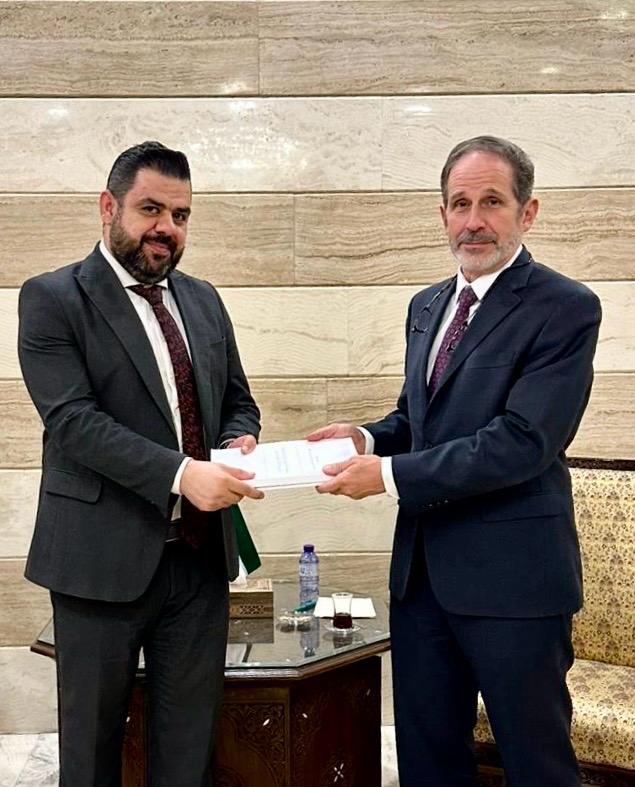

IIIM publishes Arabic translation of its Detention Report: a tool to support justice and accountability for torture and other crimes attributed to the former Assad government.
The International, Impartial and Independent Mechanism (IIIM) has released the Arabic translation of its Detention Report: The [Former] Syrian Government Detention System as a Tool of Violent Repression.
Completed in June 2024, with a redacted version published in English in December 2024, the report demonstrates that the former Syrian government’s detention apparatus was not a legitimate justice system but a central instrument of violent repression, coordinated by the former government leadership and entities including intelligence branches, military hospitals and military police.
Based on more than 300 witness interview records, over 800 official documents, forensic medical analyses, and insider accounts, the report provides evidence and analysis designed to support judicial proceedings at both international and national levels. The IIIM’s evidence and analysis document torture, enforced disappearances, and other crimes systematically committed by the former Syrian government.
This week during meetings in Damascus, IIIM Head Robert Petit provided copies to the Syrian Government and other officials including the National Commission for Transitional Justice Commission and the National Commission for Missing Persons.
While most of its reports are not made public, the IIIM has made this version available to facilitate broader justice objectives and contribute to ongoing accountability efforts.
All references in the report to the “Syrian Government” refer to the former Government of Syria.
The Arabic version of the Detention Report is available to download on the IIIM website
Advancing Accountability for Chemical Weapons Crimes


Damascus, 30 September 2025: The International, Impartial and Independent Mechanism (IIIM) participated alongside Syrian civil society, victims/survivors, government representatives, and international organizations at the Third Syrian Civil Society International Conference on Chemical Weapons in Damascus. Held under the theme “Justice and Accountability for Chemical Weapons Use in Syria – A Renewed Hope for Action After 13 Years of Impunity,” the conference renewed calls for accountability as a cornerstone of Syria’s future.
Speaking at the opening panel, IIIM Head Robert Petit emphasized that with its mandate to focus on individual criminal responsibility, the IIIM is uniquely placed to assist accountability for chemical weapons crimes. He underlined that delivering inclusive justice for victims/survivors of chemical weapons crimes is essential for a just and lasting peace in Syria.
The IIIM has established a dedicated line of inquiry into unlawful attacks, including chemical weapons, and is currently developing two casefiles, among them the sarin attacks of March and April 2017 in Hama and Idlib Governorates, including Khan Shaykhun. These casefiles are built to international criminal law standards, a higher threshold, to ensure their potential use in criminal proceedings before different jurisdictions. In developing this work, the IIIM draws on the documentation and advocacy of Syrian civil society organizations, medical NGOs, victims/survivors, and advocacy groups, while also building on the work of the OPCW Fact-Finding Mission, the UN Joint Investigative Mechanism, and the OPCW’s Investigation and Identification Team. The IIIM has also conducted additional witness interviews with victims/survivors, doctors, and first responders, paying attention to the long-term physical and psychological impact of attacks, particularly on women and children.
The IIIM’s preservation of evidence and information it receives continues to expand its Central Repository. Sharing evidence with the IIIM has enabled it to support 251 investigations in 16 national jurisdictions. This includes sharing evidence with French authorities in their case against Bashar al-Assad and others for the 2013 chemical attacks in Ghouta and Douma.
The participation of Syrian government representatives, together with survivors and civil society, highlights a new opportunity for national ownership of accountability efforts, supported by international justice mechanisms such as the IIIM.

© SANA
IIIM Receives 500th Request for Assistance
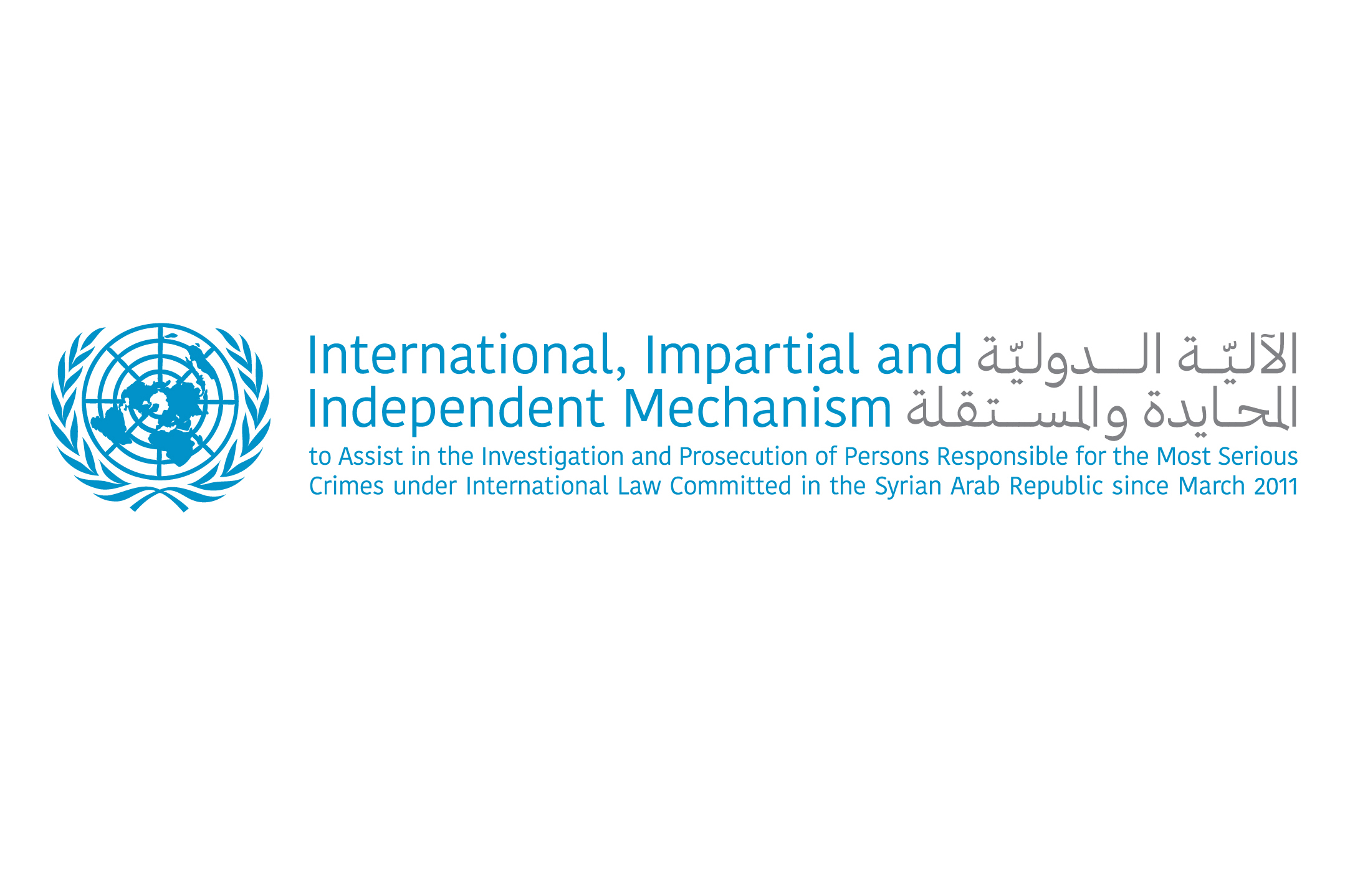

Geneva, 19 September – The IIIM today announced it has received its 500th request for assistance (RFA) since it became operational in 2018. These requests are submitted by jurisdictions seeking the IIIM’s specialized expertise and resources to support their Syria-related investigations and prosecutions.
IIIM Head Robert Petit highlighted the significance of this milestone, “These requests represent 338 distinct investigations, each one an important step towards accountability”. He added, “Though these are challenging times, we remain focused on responding to requests as well as proactively sharing material to seize every opportunity to deliver the justice victims and survivors deserve.”
To date, the IIIM has received RFAs from 17 jurisdictions, supporting their efforts through the sharing of information, evidence and analytical products.
This 500th request demonstrates the ongoing international commitment to the pursuit of justice and the critical role of the IIIM’s mandate in strengthening the work of jurisdictions.
These collective efforts send a clear message to perpetrators of serious crimes in Syria, there will be no escape from accountability, no matter how long it takes.
About the IIIM
The International, Impartial and Independent Mechanism (IIIM) is a United Nations organisation, established in 2016 by the UN General Assembly in a landmark vote. It is mandated to assist in the investigation and prosecution of individuals responsible for committing the most serious international crimes (including war crimes, crimes against humanity, and genocide) in Syria since March 2011.
The IIIM works to collect and preserve evidence from multiple sources to support current and potential future accountability proceedings. A significant number of its sources and information providers are Syrian civil society actors.
The IIIM’s work can be used by jurisdictions with the legal authority to prosecute international crimes, thereby supporting accountability for atrocities committed during the Syrian conflict.
It shares information, evidence and analytical products either in response to requests for assistance or proactively with competent jurisdictions.
It integrates a victim survivor centred approach and proactive strategies on gender and children/youth throughout its work, holding regular consultations and engagements with Syrian civil society and victim/survivor communities.
It is not a court or tribunal; it cannot issue indictments or conduct trials and does not have prosecutorial powers.
The IIIM is:
- Independent: Works without external instructions or influences. It does not share details of the justice processes it supports publicly except as authorised by competent jurisdictions.
- Impartial: Works to cover all international crimes committed by all parties in the conflict, no matter the affiliation, without bias.
- Rigorous: Applies international criminal law methodologies throughout all tracks of its work.
Since the start of its operations the IIIM maintained its efforts to initiate cooperation from the Syrian Arab Republic, in line with its commitment to impartial and inclusive justice. Its calls went unanswered until December 2024, when it was invited to access Syria for the first time. 48 hours later the IIIM Head led a small delegation to Damascus coincidentally on the same day as the Mechanism was established in 2016.
-ENDS-
IIIM’s Unofficial translation of key parts of the judgment in the case of Anwar R.


The IIIM is pleased to share an unofficial translation of key parts of the judgment in the case of Anwar R., issued in January 2022 by the Koblenz Higher Regional Court in Germany. The investigation that led to this judgment was supported by information and evidence provided by the IIIM.
When the ruling was publicly disclosed after it became legally binding in 2024, the IIIM committed to making it more accessible, especially for Syrian victims and survivors, by translating the original German judgment into both Arabic and English.
These translations aim to support a broader understanding of this milestone case and its significance for justice and accountability for core international crimes committed in Syria since 2011.
To view the unofficial English translation of the judgment, click here and for the unofficial Arabic translation click here.
Developing and Maintaining Open-Source Investigations Capacity from Scratch
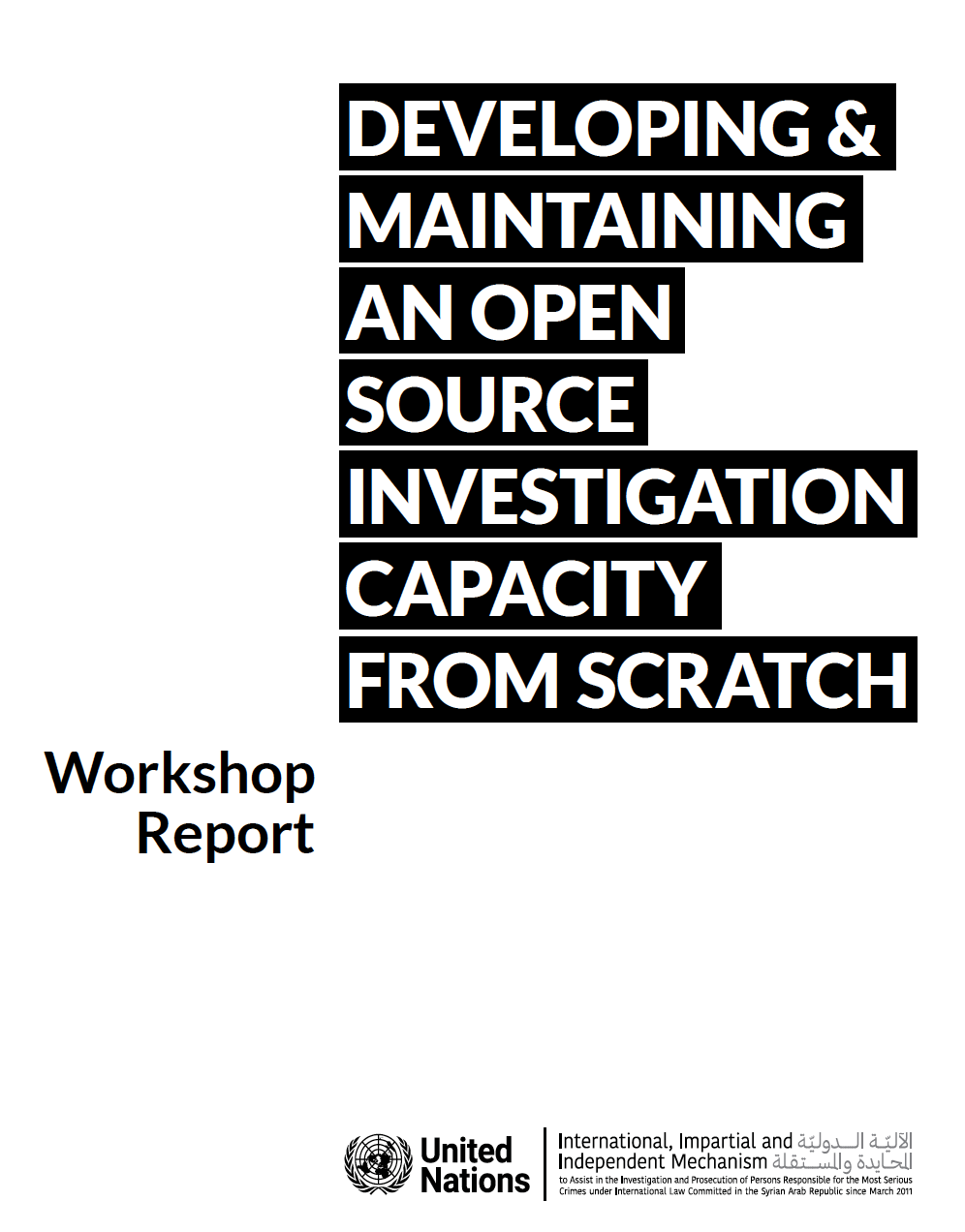

The benefits of open source information in investigations of violations of international criminal, human rights, and humanitarian law are widely acknowledged and well-documented.
However, issues relating to establishing dedicated open source investigation operational capacities have garnered less attention, particularly in defining relevant processes and building the necessary infrastructure to support open source investigators. These issues are not unique to any one organization, but impact investigative and accountability bodies involved in open source activities worldwide.
To address this gap, the IIIM invited accountability- and investigative-focused international organizations, nongovernmental organizations (NGOs), and civil society organizations (CSOs) to a closed workshop on information and evidence management in the context of open source investigations. The event itself was situation-neutral and did not involve sharing substantive information about any open source investigations or analyses.
This workshop provided participants with a unique opportunity to share best practices and lessons learned from leading organizations in the field. Case studies and panel discussions addressed shed light on various issues.
This report summarizes the discussions that took place.
To read the full report click here.
IIIM statement on Stuttgart Higher Regional Court Trial


Geneva, 16 June – The IIIM welcomes the Trial Judgment by the Stuttgart Higher Regional Court in the case of Alaa M., sentenced to life imprisonment for war crimes and crimes against humanity.
The former Syrian doctor was found guilty of torturing, sexually abusing, and killing detainees at the Homs Military Hospital and a military intelligence facility between 2011 and 2012.
The IIIM supported the investigation by providing information and evidence, and by facilitating the testimony of a key witness. Universal jurisdiction cases represent one of the important avenues to provide justice for victims/survivors of crimes committed in Syria.
IIIM and Institution on Missing Persons strengthen cooperation
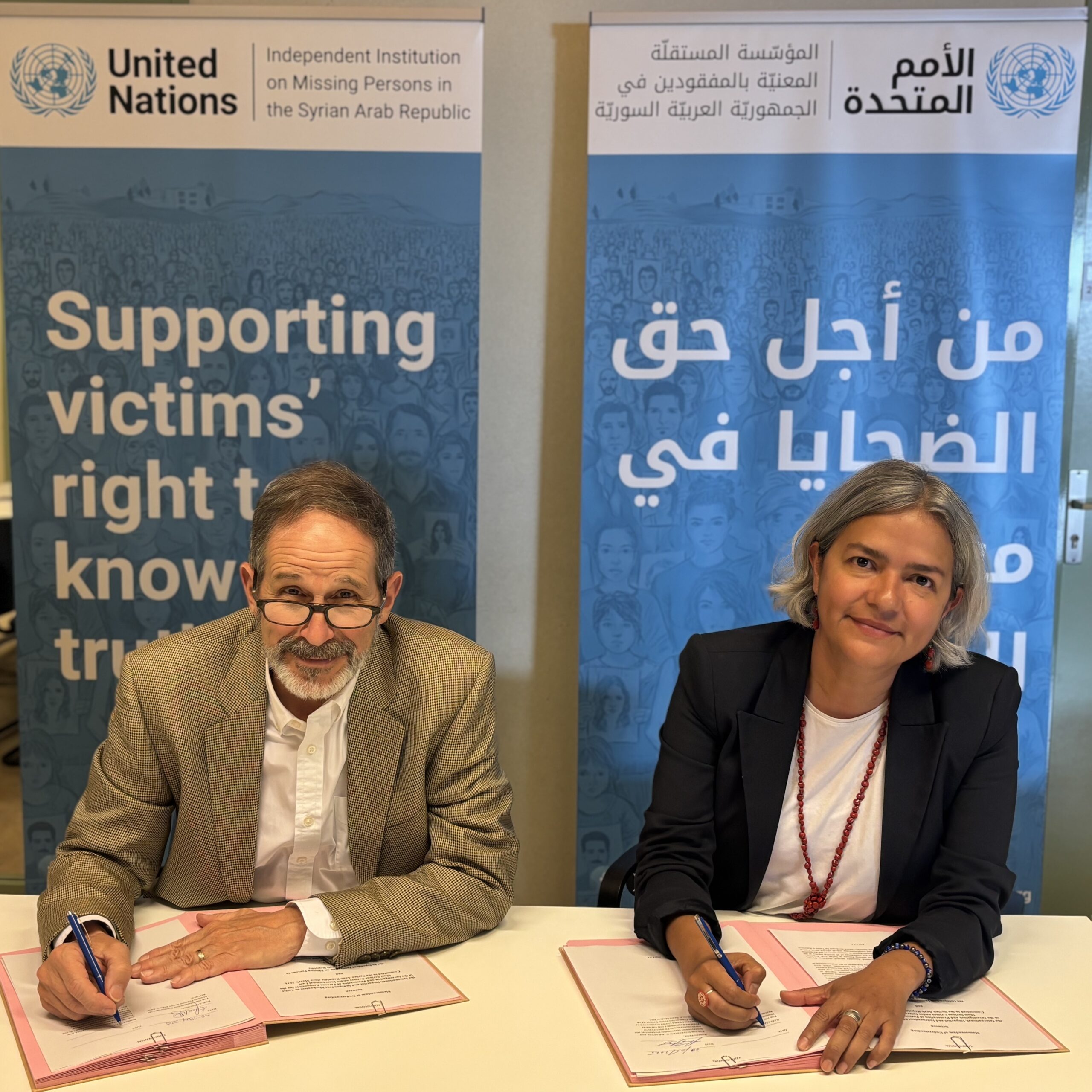

Geneva, Friday 30 May 2025. The Independent Institution on Missing Persons (IIMP) and International, Impartial and Independent Mechanism (IIIM) signed a memorandum of understanding to enhance cooperation between both entities, with a focus on supporting the search for missing persons in Syria.
Karla Quintana, Head of the IIMP, and Robert Petit, Head of the IIIM, have coordinated efforts closely since Ms. Quintana took office. “This partnership reflects our shared commitment to addressing the profound suffering of families searching for their loved ones. While the IIMP’s humanitarian mandate is focused on the urgent need to clarify the fate of the missing, the IIIM remains dedicated to ensuring that those responsible for serious crimes are held accountable. Together, we aim to support a more comprehensive coordinated approach to justice and truth for the Syrian people.”
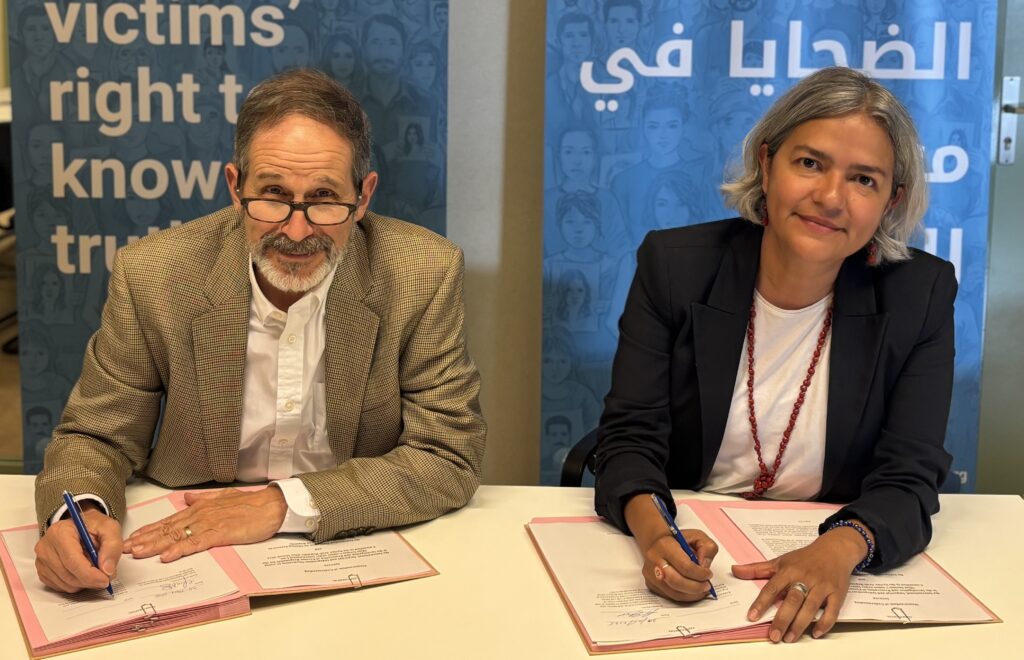
“Justice in Syria by Syrians, for Syrians”


A Syrian-led, internationally supported justice process – this was the key message from ASG Robert Petit, Head of the IIIM, at a timely webinar hosted by the Caesar Families Association and the Truth and Justice Charter. The discussion focused on the perspective of Syrian families following the establishment of two long-awaited National Commissions on Transitional Justice and Missing Persons.
ASG Petit emphasized the importance of national ownership in justice processes:
“Our mandate is to prepare for substantive accountability for crimes committed in Syria… The best scenario, certainly the most important, is justice in Syria by Syrians for Syrians… for Syrians to dispense justice for victims and survivors of crimes committed, regardless of the perpetrators.”
Acknowledging the scale and complexity of violations committed in Syria, he added:
“The creation of a National Transitional Justice Commission is a very important first step, but it is only the beginning of a long journey… We stand ready to contribute our technical expertise and support.”

Moderated by Ahmed Helmi from Taafi Initiative, speakers also included:
▪️ Ms. Mariam Al-Hallak, Founder of Caesar Families Association
▪️ Ms. Joumana Seif, European Center for Constitutional and Human Rights (ECCHR)
▪️ Ms. Mayassa Al-Sheikh Ahmad, Human Rights Activist
▪️Ms. Yasmen Almashan, Head of Caesar Families Association
▪️ASG Karla Quintana-Osuna , Head of the Independent Institution on Missing Persons in the Syrian Arab Republic (IIMP)
The panel underscored the importance of centering families and victims in all justice efforts, and discussed how the IIIM can engage with Syrian-led bodies in the pursuit of truth, accountability, and justice.
🔗 Watch the full webinar here: https://lnkd.in/d9ptgjKs
